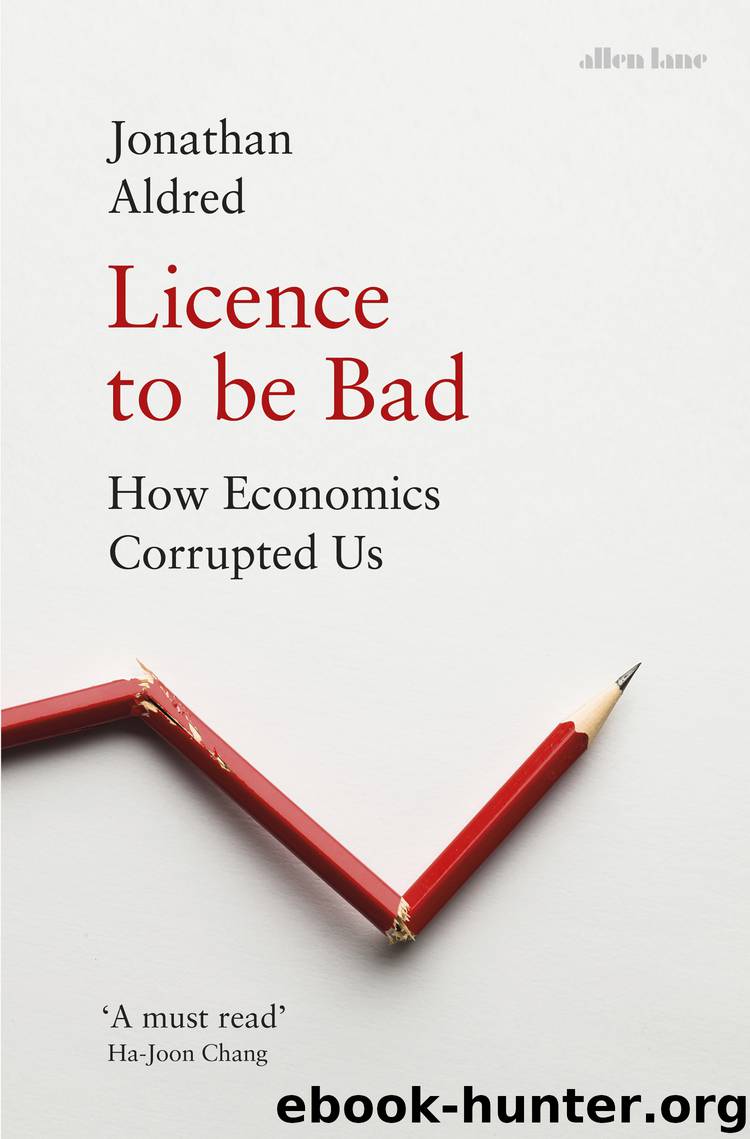Licence to be Bad by Jonathan Aldred

Author:Jonathan Aldred
Language: eng
Format: epub
ISBN: 9780241325445
Publisher: Penguin Books Ltd
Published: 2019-06-08T16:00:00+00:00
BIG SHOT MEETS A YANKEE ACTRESS
There is an old joke about a rich and famous man who meets a woman at a party. Perhaps the earliest version, allegedly a true story, involved the British media tycoon and politician Lord Beaverbrook encountering a ‘Yankee actress’. The year was around 1937. (In subsequent retellings the big shot has been, among others, George Bernard Shaw, Groucho Marx or Winston Churchill.) The conversation goes something like this.
Big Shot: ‘So will you spend the night with me for £10,000?’
Actress: ‘Well …’
Big Shot: ‘How about £100?’
Actress: ‘What kind of person do you think I am?’
Big Shot: ‘We have already established that. We are just haggling over the price.’
As well as implying that you can get almost everyone to do almost anything if you pay them enough, this economic theory of motivation has a less obvious but equally dubious implication. Since money can substitute for all other motivations (if you pay enough), most economists see it as interchangeable with all motivations, a neutral common currency in terms of which all motivations can be expressed. It is a one-dimensional picture of human motivation in which money simply adds to existing motivations or replaces them when they are absent. But money, and material benefits and costs more generally, cannot play this neutral role. In the real world money comes with psychic baggage. Just in the way that a gift can trigger gratitude or resentment in the recipient, depending on how they perceive the motives of the giver, financial carrots can also trigger a range of responses in those on the receiving end of the inducement.
In early 1993 the Swiss government was trying to decide where a (low-radioactivity) nuclear-waste dump should be sited. One possibility was to locate it near Wolfenschiessen, a small Swiss village of 640 families. In hour-long interviews with over 300 residents, they were asked how they would feel if offered financial compensation to agree to the dump. Support for the local siting of the dump fell by more than half once the compensation was offered. Eighty-three per cent of those who rejected the money explained their rejection by saying that they could not be bribed.8 When some day-care centres in Haifa, Israel, introduced fines to discourage parents from collecting their children late, more parents arrived late.9 Like the Swiss villagers, the Haifa parents saw the financial incentive as trying to buy their compliance rather than persuade them. With a ‘price’ for lateness now established, the parents treated the fine as a fee – a fee which bought them the right to collect their children later.
Evidence such as this was greeted with shock by economists, although the possibility that financial incentives can be counterproductive is now long established among psychologists (who by the early 1970s had largely abandoned Skinner’s ideas). Introducing explicit financial incentives to get someone to do something can undermine or displace their existing intrinsic motivation: in psychologists’ language, the intrinsic motivation is ‘crowded out’.10 Often, this intrinsic motivation includes a sense of moral obligation
Download
This site does not store any files on its server. We only index and link to content provided by other sites. Please contact the content providers to delete copyright contents if any and email us, we'll remove relevant links or contents immediately.
International Integration of the Brazilian Economy by Elias C. Grivoyannis(111038)
The Radium Girls by Kate Moore(12020)
Turbulence by E. J. Noyes(8041)
Nudge - Improving Decisions about Health, Wealth, and Happiness by Thaler Sunstein(7695)
The Black Swan by Nassim Nicholas Taleb(7114)
Rich Dad Poor Dad by Robert T. Kiyosaki(6613)
Pioneering Portfolio Management by David F. Swensen(6291)
Man-made Catastrophes and Risk Information Concealment by Dmitry Chernov & Didier Sornette(6011)
Zero to One by Peter Thiel(5790)
Secrecy World by Jake Bernstein(4744)
Millionaire: The Philanderer, Gambler, and Duelist Who Invented Modern Finance by Janet Gleeson(4472)
The Age of Surveillance Capitalism by Shoshana Zuboff(4282)
Skin in the Game by Nassim Nicholas Taleb(4242)
The Money Culture by Michael Lewis(4199)
Bullshit Jobs by David Graeber(4181)
Skin in the Game: Hidden Asymmetries in Daily Life by Nassim Nicholas Taleb(3994)
The Dhandho Investor by Mohnish Pabrai(3761)
The Wisdom of Finance by Mihir Desai(3738)
Blockchain Basics by Daniel Drescher(3575)
